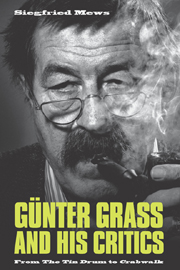Book contents
- Frontmatter
- Contents
- List of Abbreviations
- Introduction
- Part 1 Danzig, Center of the Universe
- Part 2 From Danzig to the Global Stage: Grass's Fiction of the 1970s and 1980s
- 5 Örtlich betäubt / Local Anaesthetic
- 6 Aus dem Tagebuch einer Schnecke / From the Diary of a Snail
- 7 Der Butt / The Flounder
- 8 Das Treffen in Telgte / The Meeting at Telgte
- 9 Kopfgeburten oder Die Deutschen sterben aus / Headbirths or The Germans Are Dying Out
- 10 Die Rättin / The Rat
- 11 Zunge zeigen / Show Your Tongue
- Part 3 After Reunification: Old Problems and New Beginnings
- Epilogue
- Works Cited
- Index
8 - Das Treffen in Telgte / The Meeting at Telgte
from Part 2 - From Danzig to the Global Stage: Grass's Fiction of the 1970s and 1980s
Published online by Cambridge University Press: 05 February 2013
- Frontmatter
- Contents
- List of Abbreviations
- Introduction
- Part 1 Danzig, Center of the Universe
- Part 2 From Danzig to the Global Stage: Grass's Fiction of the 1970s and 1980s
- 5 Örtlich betäubt / Local Anaesthetic
- 6 Aus dem Tagebuch einer Schnecke / From the Diary of a Snail
- 7 Der Butt / The Flounder
- 8 Das Treffen in Telgte / The Meeting at Telgte
- 9 Kopfgeburten oder Die Deutschen sterben aus / Headbirths or The Germans Are Dying Out
- 10 Die Rättin / The Rat
- 11 Zunge zeigen / Show Your Tongue
- Part 3 After Reunification: Old Problems and New Beginnings
- Epilogue
- Works Cited
- Index
Summary
“Gruppe 1647”
APPROXIMATELY A YEAR AND A HALF after the publication of the vast and controversial novel Der Butt, the much less voluminous “Erzählung” or prose narrative Das Treffen in Telgte (Treffen) appeared in the spring of 1979; rather surprisingly in view of Grass's political and aesthetic stance, which contravened official GDR doctrine (see A. Weber 1995, 149 n. 66), an edition became available a few years later, in 1984, in that part of Germany. The volume is dedicated to Hans Werner Richter (1908–93) on the occasion of his seventieth birthday; Richter was the guiding light, chief organizer/coordinator, and chronicler (see H. W. Richter 1986) of Gruppe 47, the famed and influential but loosely structured association of postwar writers such as Heinrich Böll, Hans Magnus Enzensberger, Martin Walser, and, since 1955, Grass himself. The group's meetings were also attended by critics, and (eventually) publishers. During the heyday of its existence, from 1947 to 1968, the informal discussion group strove for a democratization of society and a rejuvenation of literature. In an obvious reference to Gruppe 47, Grass's narrative presents a fictional meeting of German poets and writers of the Baroque period in the small town of Telgte near the cities of Münster and Osnabrück in 1674, where the long and complex negotiations were conducted that eventually led to the Westphalian Peace Treaty and finally ended, in 1648, the major European conflict known as the Thirty Years' War.
- Type
- Chapter
- Information
- Günter Grass and his CriticsFrom 'The Tin Drum' to 'Crabwalk', pp. 169 - 187Publisher: Boydell & BrewerPrint publication year: 2008



